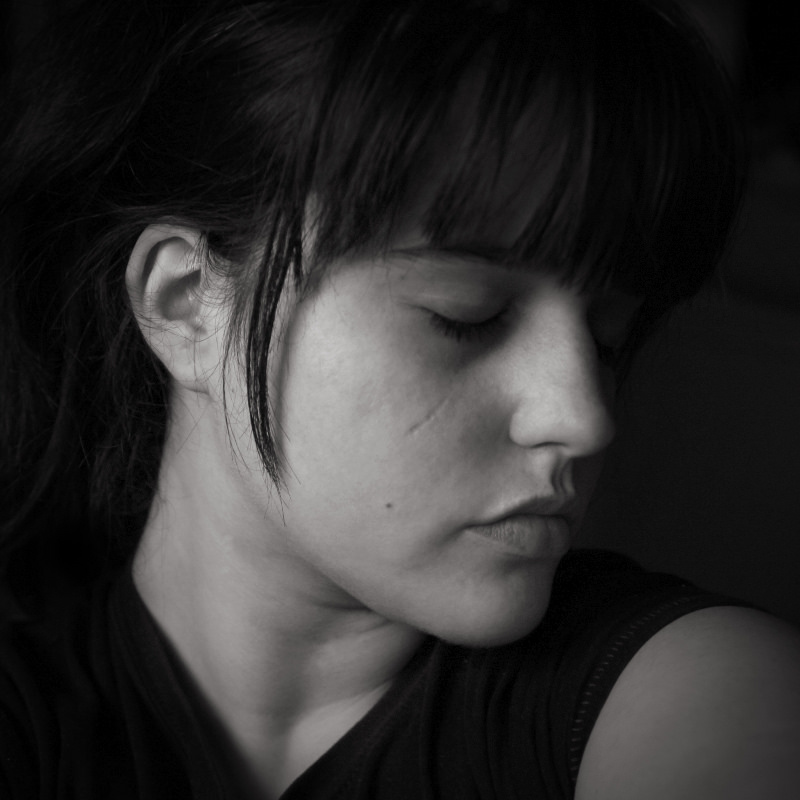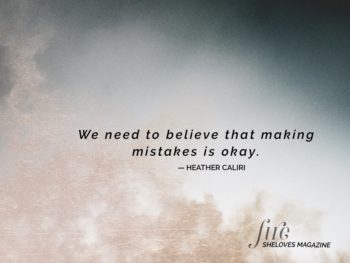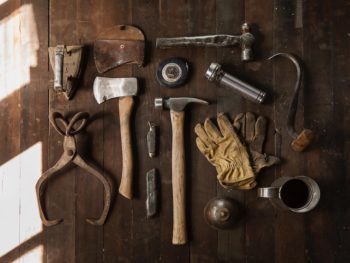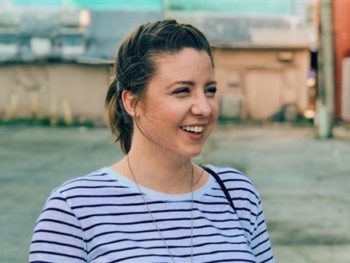
I almost didn’t read Darryl Wein’s story. It was the photo on the first page that made me want to flip past it.
Weins suffered severe burns to his face when he was electrocuted. In the picture, his skin looked like had melted on the right side, his eye and mouth sliding down his face like cheese on a hot pizza. The article explains, in detail, the kind of pain, suffering, surgery and psychic loss he’d experienced after the accident.
It hurt to think of the pain that Darryl had gone through, the continuing problems he had with eating, breathing, being, how he’d been ostracized by people uncomfortable with his face, and the new pain he was experiencing in his attempt to have a face transplant.
But the picture and article, as uncomfortable as they made me, were also beautiful. In the shot, Wein holds his daughter in his lap. She is looking away from the camera, calm and content. More than any of the grisly minutae of Wein’s suffering, the detail that stuck with me was that his daughter had never known him differently. Had never known that his appearance was anything to be bothered by. To her, his face was simply her father’s face, different, familiar, loved.
I’ve been thinking about scars lately. I shared a few weeks ago that I’ve been dealing with the abuse my friend and I suffered in youth group. I was surprised by the burden I was still carrying, one year short of my twenty-year reunion. It was empowering to take hold of that experience, begin to mourn it, write about it, have conversations about it, and admit to myself and to God that I wasn’t okay, was furious, enraged, horrified with what happened. I’m still in the middle of that process. I’ve been thinking about other hurts, deeper, older, still-healing ones.
In other words, I am allowing myself to really look at, touch, and own my scars.
There’s a tremendous emphasis on healing in the Christian church—and rightly so. Jesus was a healer; the disciples followed. I believe in healing, in resurrection power, in the lame walking and the mute singing praise.
But I’ve been wondering, lately, if healing always ends up looking pretty. I think we expect healing to be sanitized and model-ready and testimony-slick. But what if the wild, scarred beauty of a person made whole unsettles us, instead?
I’ve desired a healing that leaves no trace. That looks unblemished to everyone else. I want my face to look like other faces. I want to go back to the way I was before. I want to wave my hands and say, “That’s all done and over with. I’m fine now.”
I want my healing to not make other people uncomfortable.
But it occurred to me that when Jesus was resurrected, he still had his scars, the sword piercing in his side. He asked his shocked companions to put their hands into the holes.
The idea of sticking my finger in someone’s palm hole gives me the heebie-jeebies.
Last year at IF: Gathering, I was challenged by the words of Christine Caine, who spoke about how her identity has been radically changed in Christ. She was unwanted; she is now a beloved daughter. She was sexually abused; now she is free and empowered.
Lovely, right?
I’ll be honest: She really pissed me off.
Here’s what got me: “Many of us prefer the comfort of victimhood over what it takes to be free.” She jabbed her finger in the air a few times as she said it.
I felt like she was jabbing my chest.
I didn’t want to be angry at her. Because if anyone has the right to exhort us to move into freedom, it’s Caine. I didn’t want to admit I was angry—angry that I didn’t feel healed, angry that I thought I had tried as hard as I could to be freed, angry that I had been wounded in the first place.
I couldn’t write about it back in February because I was ashamed at my anger.
(Look: I still don’t like how aggressive her delivery was. I hate the whole “Get with the program” trope in Christianity. I’ve got way too much practice telling myself to try harder. I don’t think healing comes with effort.)
But I think her words and my anger lit a fire in me. I had to think about why I didn’t feel free. Why I was still angry, still bitter, still afraid? Why did I feel helpless about old hurts? Caine made me mad, and she made me think.
To my surprise I agree with her on this: we really don’t want to face what it will take to make us free.
You know why? It might hurt. Not just us–it might be painful for other people.
We don’t want to put our fingers in our palm holes, or endure the ache of flesh knitting back together. We do not want to take off masks that help others feel more comfortable with our scars. After all, our scars still make us shudder.
We do not want our scarred, transformed faces to see the light in a world still caught in darkness.
We do not want to be seen.
Maybe people will be kind, and understanding, and react the way we want them to when they see our tender scar tissue. But honestly, people might not.
But by hiding our scars, being afraid of owning them, we consent to still being in bondage to the past.
God offers us freedom. It is not an easy freedom, but it is worth it.
People might stare, but God surely sits with us with the same intimacy that Darryl Wein’s daughter has with him. He makes our scars beautiful, holy, whole because they are part of us. He lets us have that same kind of ease and love for ourselves, too.
I want that kind of healing. No matter what it costs.
I wonder what Wein’s face would look like in heaven. Somehow, I think it would be one that his daughter would recognize.
And there, in the light of heaven, it would be beautiful, holy, and right.
What do you think: What’s the line between staying a victim and acknowledging our scars?
Image credit: Gioia De Antoniis














 The thing you fear might save your life
The thing you fear might save your life
You got it exactly right Heather. I was reading Bonnie Gray’s book ‘Spiritual Whitespace’ and had to put it down on several occasions in order to work through past pains that I had just stuffed beneath the surface, pretending that it didn’t hurt, that I was ok, that I could move past it on my own. It was revelatory to me to find that I wasn’t ok (as evidenced by the hyperventilating that occurred as I was reading), as I’ve always been a ‘just keep moving forward’ type of girl. Confronting the issues and inviting Jesus into the hurt was so freeing, especially since I wasn’t fully aware of how bound I had been by not dealing with the pain. *sigh* Hard work, but Jesus is with us and will never let go and we will survive the attention that acknowledging the past brings. Your platform is so much more public…. God will indeed use your bravery and honesty in speaking of your struggle. Grace to you and blessings abundant!
Wow, this really resonates with me. I am very much a ‘keep moving forward’ kind of girl too. As I heal, I find that’s empowering, actually; I can be bold to pursue things even though they’re scary because I have long practice setting aside negative emotions 🙂 But the first step is always acknowledging to ourselves, with gentleness, how hurt we really are. Thanks for this support and honesty, Tamara.
This is so great Heather. Such an interesting perspective on victimhood and being known. I saw the IF:gathering and had the EXACT same reaction to Christine Cain–she made me spitting mad and also….tired. I have to think this through more!
I am glad to know I am not the only one she made angry 🙂 Now I feel better!
Blessings and grace to you as you think and process. It is NOT EASY to heal, and the more I accept that, the better the healing seems to go 🙂
Heather, this is not a direct response to this beautiful post. I love reading your blog- I also am discovering my post-perfectionist faith. My husband and I recently met a Christian couple who was asking about the time we spend in the Bible. It made me really uncomfortable. I am okay with the fact that I don’t read my bible everyday. I am learning to trust more instead of try harder. I have a five month old baby- and sometimes it’s just not possible to do “daily devotionals” and all. But talking with this other couple left me feeling weary and drained. What is that all about? I would love to know your thoughts as to what do you do when other Christians try to get you back on the success treadmill? How do you hear His voice in the midst of it?
I hear you–I have spent SO LONG feeling ashamed about the ways I don’t and do connect to God.
First, I would really really be at peace with yourself about what you do and don’t do. Be intentional about it. If you are making deliberate choices, and you feel peace about them, it is easier to look people in the eye and feel peace in the face of their questions or judgement.
I wonder where your discomfort came from? Were they explicitly judgmental? Were you _worried_ about them judging from their tone or their questions? I think it’s good to know which it is. I find myself defensive sometimes and then later realize I was reading too much into someone’s tone. We can feel judged because we are actually still feeling ashamed.
If people are more explicitly judgmental and dismissive of you, I think having compassion them is important. They are on a journey, and they are trying, just as you are, to connect to God. They are trying to encourage you and sharpen you. That’s something to celebrate, even if their way of showing it isn’t helpful. Your compassion towards them is also compassion towards yourself. (This one is super-hard for me. I tend to get all judge and holier-than-thou….ironically enough 🙂
A noncommittal response, like “You’ve given me a lot to think about,” or “I can see how passionate you are about this,” or “thank you for your insight into this subject,” is great for that. You kindly close the subject, and treat them respectfully, and probably let them think they’ve won 🙂
Honestly, sometimes it’s good to stay away from people or situations that make you feel less-than. Finding people online, in books, or (even better) down the street from you can help you stay sane. I can’t attend some churches, I feel tentative with super-conservative people, and I don’t tend to read super-conservative books. That’s not because I think there’s no value in those things–there’s loveliness in all sorts of expressions of faith–but because I feel crumpled by them! So I try to surround myself, as much as possible, with things that actively build up my faith. The stronger I get, the less I have to avoid these things. I just had a conversation with a friend who is much more conservative than I am about the Bible and inerrancy and interpretation. We very much disagreed, and yet I came away feeling fine about her and me. It was a huge surprise!
Let me know if that helps!
Wow, thanks so much for this really thoughtful reply, Heather. I really appreciate it. I really liked the suggestions you gave me for noncommittal responses I could say. That was so helpful for me. As an internal processor and introvert I often can’t respond the way I’d like to in the moment.
This :”We can feel judged because we are actually still feeling ashamed.”
Wow. I totally think that is part of it. Like I think they said I wasn’t Christian-y enough because of the way the husband was asking me questions about my time in the word. I totally felt defensive and like they were questioning my relationship with Him. I don’t know why I care so much about what I think other people, people I barely know think about Him and me. I do feel like I ‘should’ be reading my Bible everyday but it’s not always possible. And I need Him to be my all to be okay with that. Clearly I am still feeling ashamed because I’m not connecting with Him the way they are or the way they think I should.
Thank you so much for your insight. I really do have lots to think about and ask Him to reveal where that shame is coming from.
You’re welcome! I am in this process with you. It takes a long time to unlearn our habit of feeling ashamed.
Thank you for sharing your thoughts so beautifully, Heather. The thing I wonder is this: if Jesus is our companion and healer in our pain, isn’t he perfectly patient with us in the process? Sometimes we can handle only so much working through it at a time—in this, we can be oblivious to some other areas of hurt until we have the ability (with God’s help) to deal with them. If he is this patient with us, can’t we learn to be patient with ourselves and others?
This makes me laugh because I have been struggling to learn this SO MUCH and I’m wondering how you saw inside my head. Yes, yes, and yes. We can have grace and patience as we heal, and Jesus is so very patient with us as we’re in process. It’s such an over and over faithfulness as we get better, and that is okay and natural and fine. Yet I usually expect myself to pick myself up after trauma and keep walking as if nothing happened. I am trying to unlearn that attitude, and have made crazy headway, but it still doesn’t come naturally to me. Thank you for these wise words, Suzanne 🙂